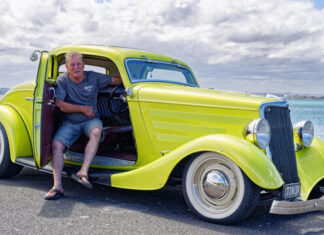Andrew Mathieson
POMP and ceremony is all in a night’s work for Erik Hemmann.
The owner and head chef at the Rheingold cellar restaurant changes into a Bavarian costume just before the arrival of his famous pig.
In anticipation, Erik makes a proclamation to the throng of anxious diners.
“I know one thing about you all – you are all very hungry,” he tells them.
“I can change that situation within half an hour.”
Erik, brandishing and sharpening his best three carving knives, calls out attention, or “achtung” in his German tongue.
He then announces, selected from the crowd assembled, the names of the trusted pig carriers to a rapturous ovation.
“I put their names in the book and I now have thousands of names,” Erik later explains.
Erik, in a sturdy voice, will declare tonight’s pig number 4022 during the ritual.
He’s been keeping count since the first in 1982.
“We have never lost one by the way, although one did seem to walk away. Actually it was sabotaged,” he frowns.
The ritual’s origins come from the village of Hahndorf and were suggested, of all things, by a Jewish friend.
At first, Erik was reluctant.
“Now it’s usually the customers (who) are asking whether they can carry the pig,” he says.
“So I give them all a couple of schnapps when they mention it.”
The same friend told Erik to model the ritual on German cuisine with a Bavarian twist.
But it could have just as easily been a Cambodian restaurant after the leanings of Erik’s Chinese-Cambodian wife, Heang.
The Malop Street site was a former bank and later the upmarket Tellers restaurant before Erik renamed it the Rheingold in 1980.
“I think this name has given me everything that I have needed,” Eric ponders.
“I have become quite a well off person.”
He says, though, it was still a “very bad struggle” initially.
“On the second Friday I was sitting here with all the food cooked in an empty restaurant,” Erik recalls.
“Not one customer came.
“I had to check to see whether or not the wind had closed the door.
“It was horrible but it was the only evening that I was a bit scared that this restaurant wouldn’t work.”
Erik was previously a chef for Air New Zealand before arriving in Australia in 1980.
It all started after an apprenticeship on the Rhine River before enrolling in the West German navy.
However, Erik grew up, in fact, under the harsh East German communist regime.
He fled the country in 1960 aged 16, years after his father had already left.
“I escaped on my own, even without telling my mother,” he says.
“I just took a couple of sandwiches and I said ‘bye-bye home’.”
Erik has been a changed man since.
The Rheingold’s character has since brought out an energetic personality for which he is now famous.
He recalls his first time on stage after a bit of gentle persuasion.
“Come on Erik, talk to the people here,” a few friends first yelled out.
“No, my English – they can’t even understand me,” Erik responded.
“No, just come and say a few nice words,” they all pleaded.
Erik got caught up in the moment.
“Naturally I had to smile and remember the words, a little bit in German, and some of them laughed about what I said and some of them laughed about my unskilled English,” he now laughs.
Next on the agenda for the local bratwurst king is a cooking school.
Already his 18-year-old son, Sven, is keen to take over the family business, and daughters, Hanya, 23, and Julia, 20, also wait on tables.
“Doesn’t matter if I do it or someone else,” Erik says.
“The city is too big and too international not to.”
But don’t expect him to walk away too soon just yet.
“I learn so much from other people’s ways of life,” he smiles.
“It makes it so easy to crawl into Australian society.”
He’s putting some pork on our forks
Digital Edition
Subscribe
Get an all ACCESS PASS to the News and your Digital Edition with an online subscription
Hot rods roar to life
One of the region’s biggest classic car and hot rod events will roar back to life for another year in Queenscliff.
Queenscliff Rod...








